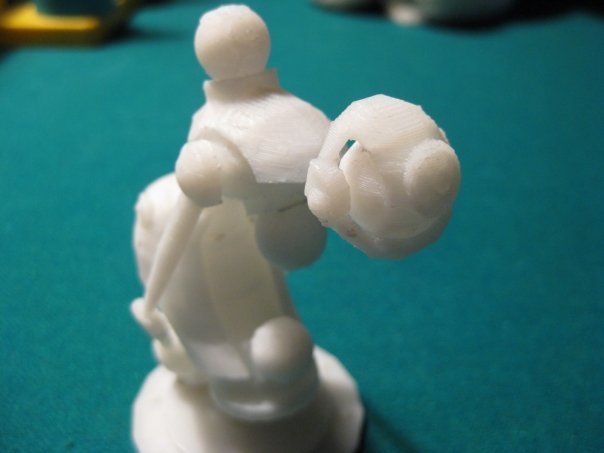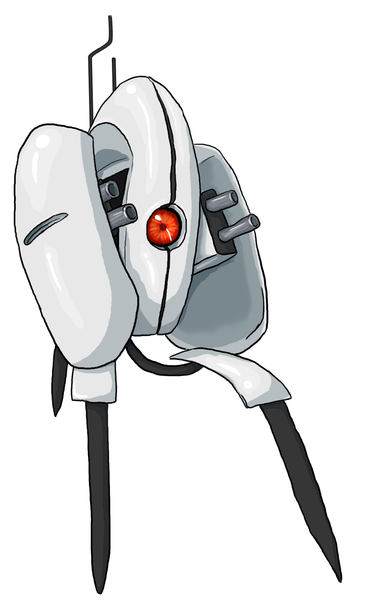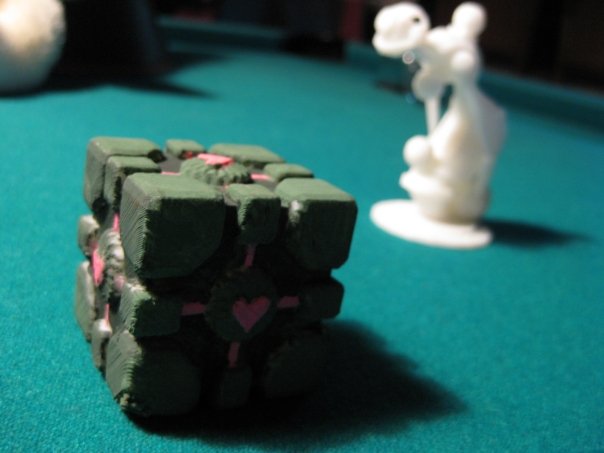This post has not been edited by the GamesBeat staff. Opinions by GamesBeat community writers do not necessarily reflect those of the staff.
There aren’t many characters in Portal – about five depending on your definition of a character.
Chell is basically a blank slate. She has no real background of which to speak. Hell, it takes a bit of work just to get a semi-decent look at her. Not much to analyze, so we’ll set her aside for some more interesting characters.
 Genetic Lifeform and Disk Operating System – you may know her/it better as GLaDOS – is the main antagonist of Portal. Born from Portal and Psychonauts writer, Erik Wolpaw’s text-to-speech program. GLaDOS began as comic relief, until playtesters began to associate her as a villain and motivator for the player.
Genetic Lifeform and Disk Operating System – you may know her/it better as GLaDOS – is the main antagonist of Portal. Born from Portal and Psychonauts writer, Erik Wolpaw’s text-to-speech program. GLaDOS began as comic relief, until playtesters began to associate her as a villain and motivator for the player.
And that’s exactly GLaDOS’s purpose: as the only substantial “person” in Chell’s life, she’s the only one who can provide the escape Chell is hoping to find. She motivates the player to move forward, to attain the goal – the princess to Mario, freedom to Chell, cake to GLaDOS.
I could go more in depth on GLaDOS, but people much better than I have already done it – Game-ism.com’s Still Alive? She’s Free and Wherein I Overanalyze GLaDOS’s Song.
 Instead, let’s jump into the second stop on our Portal character analysis train: the turrets. Each turret acts as a miniature version of GLaDOS. From their voices, to their design, to their personality, every turret has similar, yet lessened characteristics of GLaDOS.
Instead, let’s jump into the second stop on our Portal character analysis train: the turrets. Each turret acts as a miniature version of GLaDOS. From their voices, to their design, to their personality, every turret has similar, yet lessened characteristics of GLaDOS.
Even from an in-game perspective, the turrets can’t escape their “GLaDOS Lite” status, providing the player a small goal for each one successfully circumvented.
But while the turrets are clearly under the control of GLaDOS’s titanium fist, the player may end up feeling sorry for all the turrets they’ve felled. Look at it from the turrets’ perspective: GLaDOS has given them one task, to stop Chell. Like Labrador Retrievers, the turrets will blindly follow the commands of their master, just hoping to please her. Chell’s beef is with GLaDOS, not the turrets. Should they really be punished for the wrongdoings of their master?
The exact opposite of the obedient turret is our next character: Dr. Doug Rattmann aka “Rat Man.”
 If you’ve yet to dig into the surprisingly rich back-story for Portal, you may not know who this character is, though you almost certainly saw his work in the original game. Rattmann was an Aperture Science employee who found himself caught in the testing chambers as GLaDOS flooded everywhere else in the facility with a deadly neurotoxin. GLaDOS then forced the doctor to be a test subject.
If you’ve yet to dig into the surprisingly rich back-story for Portal, you may not know who this character is, though you almost certainly saw his work in the original game. Rattmann was an Aperture Science employee who found himself caught in the testing chambers as GLaDOS flooded everywhere else in the facility with a deadly neurotoxin. GLaDOS then forced the doctor to be a test subject.
With his high security clearance and knowledge of the facility, Rattmann was able to find openings in some of the chambers and build “Rat Man Dens.” These dens showcased the mental breakdown Rattmann went through as he tried to navigate the chambers.
Rattman is the only sign of human life Chell comes in contact with during the course of the game. He’s clearly a smart guy, quoting poetry and leaving clues as to how to persevere through the test chambers. It’s somewhat ironic the manifestations of his insanity theoretically keep Chell sane throughout the course of the game.
And finally, the main event: what likely was the last straw for Rattmann’s sanity, the Weighted Companion Cube.
Objectively, it’s just like any other Aperture Science Weighted Storage Cube, save for its heart logos on each side. It has no special powers, will never threaten to stab you and, in fact, cannot speak.
each side. It has no special powers, will never threaten to stab you and, in fact, cannot speak.
On a more subjective note, it’s the best thing ever. Canonically, it’s the only friend you meet. GLaDOS expects you to have a deep attachment to it. Rattmann obviously has some strong love for the six-sided box.
Outside of the plot, the Companion Cube design is absolutely brilliant. It’s Valve slap to the face of every other escort mission in every other game there is. The cube is absolutely vital for progression through the test chamber in which it’s utilized, which begs the question: who’s escorting whom?
While Chell is presumably unfazed by the pure awesomeness of the cube (apparently, she does dispose of it faster than any other previous test subject,) some players ironically became just as enthralled by the cube as Dr. Rattmann before them. These diligent (read: crazy,) people even discovered a way to save the little guy from his incinerator-filled fate through glitches.
With an extremely limited cast, Portal puts a ton of responsibility on every one of its characters. Each has been meticulously tweaked and re-tweaked until attaining that Valve sheen other developers appear unable to reproduce. Without the richness of its characters and back-story, Portal would have been a modest success at best due to its interesting mechanics. With them, however, Portal has becoming one of the greatest games of all time.
